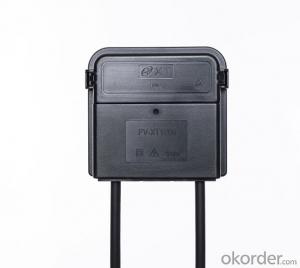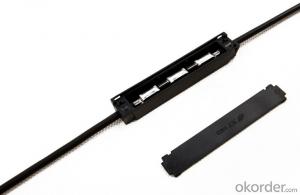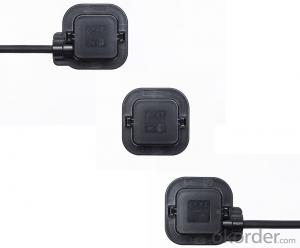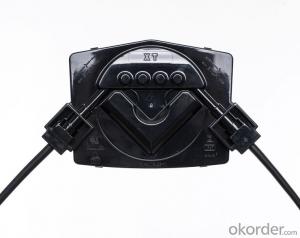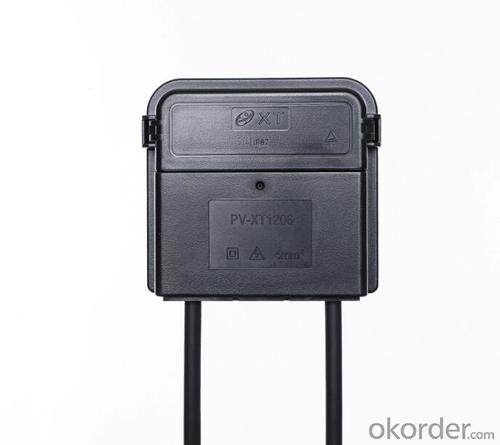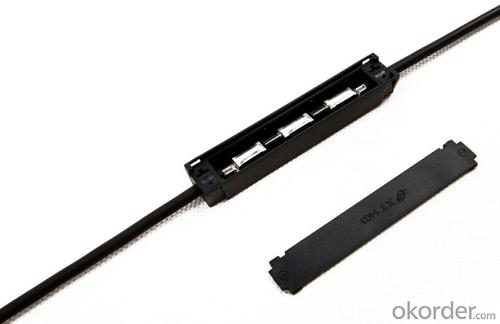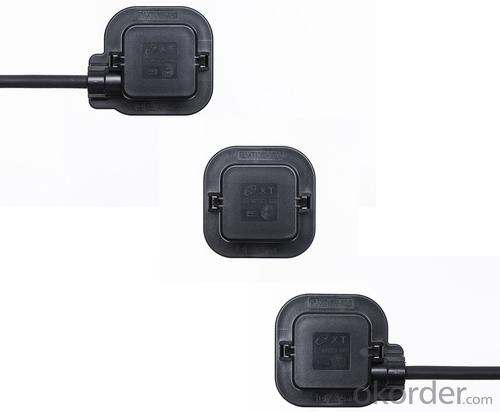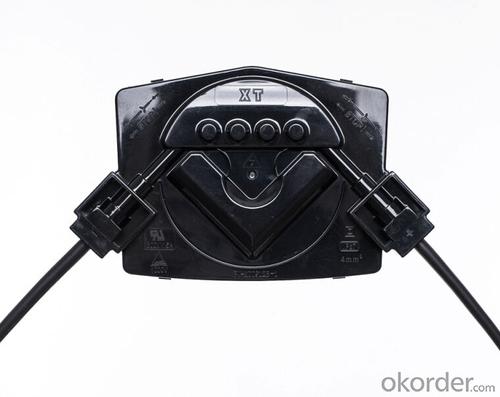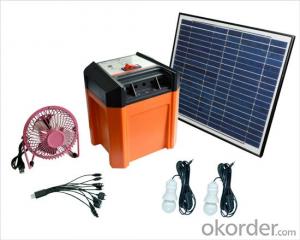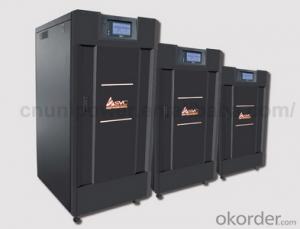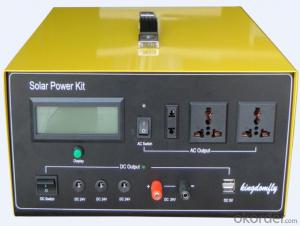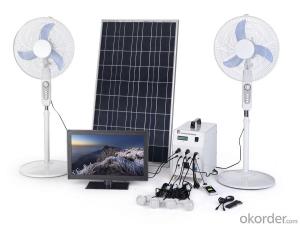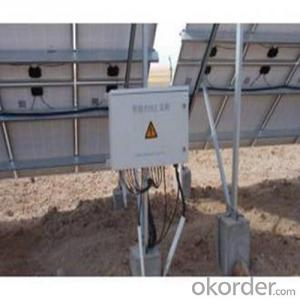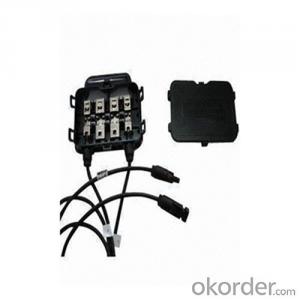City Solar Energy Systems PV Junction Box PV-1206 TUV, UL, ISO9001 Certification
- Loading Port:
- Guangzhou
- Payment Terms:
- TT OR LC
- Min Order Qty:
- 3000 pc
- Supply Capability:
- 3000000 pc/month
OKorder Service Pledge
OKorder Financial Service
You Might Also Like
Feature
a.small volume, compact structure
b. good heat output, stable and reliable
c. waterproof and excellent Dustproof performance
d. solder connection, low contact resistance
Product description
1. All the connection made by double fixed connection low power loss
2. With the capacity of anti-aging and resistance to ultraviolet radiation on the outer cover with excellent box design with good thermal dissipation
3. Demonstrating safe, realiable and excellent lasting functionality, applicable in harsh outdoors working ambient
4. Big variety for choices,1 rail ,2 rail,3 rail,4 rail,5 rail,6 rail.mini junction box and solar junction box for solar street light
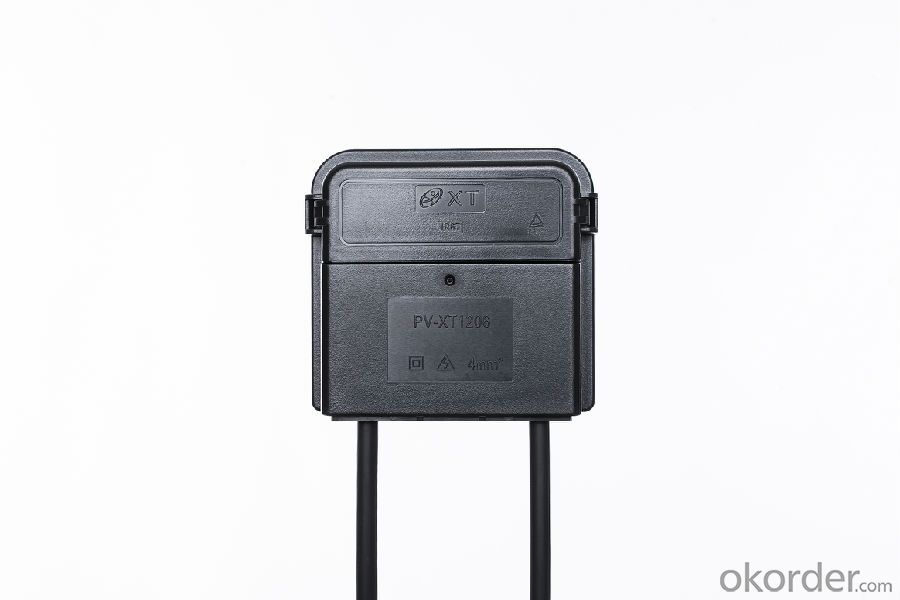
Item | Data |
Terminals for Ribbons | 4 |
Rated Current | 12A |
Rated Voltage | 1000V |
Dimension | 84*78*18mm |
Temperature | -40℃~+85℃ |
Size of Cables | 4 mm2/12AWG |
Size of Ribbons | W(6±2mm)*T(0.3±0.15mm) |
Protection Degree | IP67 |
Flammability Class | V-0 |
FAQ
1. How long will my inquiry get response?
Your inquiry related to our products or prices will be replied within 24 hours.
2. Can I get professional service and suggestion?
Well-trained and experienced staffs to answer all your questions in fluent English.
3. Do you accept OEM or customized design?
OEM & ODM, any your customized lightings we can help you to design and put into product.
4. What if I need specific design?
Distributorship are offered for your unique design and some our current models.
- Q: Can a solar energy system be used in areas with high humidity?
- Indeed, areas with high humidity can make use of a solar energy system. Although high humidity can have an impact on the functionality of a solar energy system to some degree, contemporary solar panels are engineered to endure diverse weather conditions, including high humidity. While the efficiency of solar panels may slightly decline in the presence of high humidity due to the moisture in the air, it is not a substantial factor that would render solar energy systems inefficient. Moreover, adequately maintaining and cleaning the panels can alleviate any possible problems caused by humidity. In conclusion, areas with high humidity can still effectively employ solar energy systems.
- Q: Can solar energy systems be used in powering community centers or social organizations?
- Absolutely, community centers or social organizations can definitely utilize solar energy systems to power their facilities. Solar energy is an eco-friendly and renewable power source that can cater to various electricity needs such as lighting, heating, and running electrical appliances. To meet the electricity requirements of their members or visitors, community centers and social organizations often consume a significant amount of energy. By installing solar panels on their rooftops or in nearby open spaces, these organizations can generate their own electricity and reduce their reliance on the traditional power grid. One of the major advantages of utilizing solar energy systems is the long-term cost savings they offer. Although the initial installation costs may be higher compared to conventional power sources, solar panels have a lifespan of 25-30 years and entail minimal maintenance. Consequently, over time, the investment made in solar energy systems can be recouped through reduced electricity bills. Additionally, solar energy systems are environmentally friendly as they produce no greenhouse gas emissions during operation. By harnessing solar power, community centers and social organizations can play a role in mitigating climate change and diminishing their carbon footprint. In areas prone to frequent power outages, solar energy systems can provide a reliable source of electricity. By incorporating battery storage systems, excess solar energy can be stored and utilized during periods of low or no sunlight, ensuring uninterrupted power supply to the community center or social organization. Furthermore, solar energy systems can serve as an educational tool for social organizations to raise awareness about renewable energy and sustainability. By showcasing the advantages and viability of solar power, these organizations can inspire community members to consider adopting clean energy solutions in their own homes and businesses. In conclusion, solar energy systems are a feasible and sustainable option for powering community centers or social organizations. They offer cost savings, environmental benefits, reliability, and educational opportunities. By embracing solar power, these organizations can set an example and contribute to a more sustainable future.
- Q: Can solar energy systems be used for powering data centers or IT infrastructure?
- Yes, solar energy systems can definitely be used for powering data centers or IT infrastructure. Solar panels can generate electricity from sunlight, which can then be used to power various electrical components in data centers like servers, cooling systems, and networking equipment. Additionally, advancements in solar technology have made it possible to store excess solar energy in batteries, ensuring a continuous power supply even during cloudy periods or at night. This not only reduces reliance on traditional power sources but also helps in reducing carbon emissions and overall energy costs for data centers.
- Q: Can solar energy systems be used in areas prone to earthquakes?
- Yes, solar energy systems can be used in areas prone to earthquakes. Solar panels are designed to withstand various weather conditions, including seismic activity. However, additional precautions may be required during the installation process to ensure the stability and safety of the system in earthquake-prone areas.
- Q: Can solar energy systems be installed on vehicles?
- Yes, solar energy systems can be installed on vehicles.
- Q: How do solar energy systems affect the reliability of electricity supply?
- Solar energy systems can significantly improve the reliability of electricity supply by diversifying the sources of power generation. With solar panels producing electricity directly from sunlight, the reliance on traditional fossil fuel-based power plants decreases. Solar energy systems also often come with storage capabilities, such as batteries, which can store excess energy generated during the day and ensure a stable supply during cloudy periods or at night. This reduces the risk of power outages and enhances the resilience of the electricity grid.
- Q: What is the role of solar energy systems in achieving energy independence?
- Solar energy systems play a critical role in achieving energy independence by harnessing the power of the sun to generate clean and renewable electricity. They contribute to reducing reliance on fossil fuels, decreasing greenhouse gas emissions, and diversifying the energy mix. Solar energy systems allow individuals, communities, and even entire nations to generate their own electricity, reducing the need for importing energy from other sources. By promoting energy self-sufficiency, solar power systems contribute to greater energy independence and sustainability.
- Q: What are the maintenance requirements for solar energy systems?
- Solar energy systems require minimal maintenance. The main maintenance requirements include regularly cleaning the solar panels to remove dust and debris, checking the connections and wiring for any signs of damage or wear, and monitoring the system's performance to ensure it is generating the expected amount of electricity. Additionally, the inverter, which converts the solar energy into usable electricity, may need to be replaced after around 10-15 years. Overall, with proper maintenance, solar energy systems can last for several decades with little to no issues.
- Q: How do solar energy systems impact the grid?
- Solar energy systems can have a positive impact on the grid by reducing the reliance on traditional fossil fuel power plants and decreasing greenhouse gas emissions. However, their intermittent nature and variability in energy production can pose challenges for grid stability and management. Integration of solar energy systems requires careful planning, use of advanced technologies, and coordination to ensure a reliable and resilient electric grid.
- Q: How much energy can a solar energy system produce?
- The amount of energy that can be generated by a solar energy system relies on a variety of factors, including the system's size, efficiency, location, weather conditions, and available sunlight. On average, a typical solar energy system can produce between 1 and 10 kilowatt-hours (kWh) of electricity per day for every installed kilowatt (kW) of solar panels. To illustrate, a solar energy system with a capacity of 5 kW can generate approximately 5 to 50 kWh of electricity daily, which is typically sufficient to fulfill the energy needs of an average household. However, it is important to note that this energy production can fluctuate throughout the year due to seasonal changes in sunlight availability and weather conditions. Furthermore, advancements in solar technology and enhanced efficiency of solar panels have resulted in significant improvements in energy production. By utilizing high-performance solar panels and optimized system designs, it is possible to generate even greater amounts of electricity, thereby maximizing the energy output of a solar energy system. Moreover, any surplus energy generated by a solar energy system can be stored in batteries for future use or fed back into the power grid, depending on the specific setup and local regulations. This enables further utilization and optimization of solar energy production. Ultimately, the potential energy production of a solar energy system is a dynamic and customizable aspect that can be adjusted to meet individual energy requirements and objectives. Seeking guidance from a solar energy professional can provide more precise estimates and assist in designing a system that is best suited to specific needs.
Send your message to us
City Solar Energy Systems PV Junction Box PV-1206 TUV, UL, ISO9001 Certification
- Loading Port:
- Guangzhou
- Payment Terms:
- TT OR LC
- Min Order Qty:
- 3000 pc
- Supply Capability:
- 3000000 pc/month
OKorder Service Pledge
OKorder Financial Service
Similar products
Hot products
Hot Searches
Related keywords
